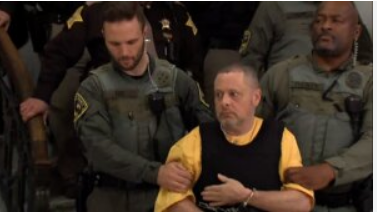In a significant turn of events, Judge Fran Gull has rejected Richard Allen’s request for a Franks Hearing, as stated in an order issued on Monday. This decision comes amid the ongoing legal battle surrounding the 2017 Delphi murders of Abigail Williams and Liberty German, a case that has captured national attention.
Detailed Analysis of the Court’s Decision
Richard Allen, accused of the heinous crime, had repeatedly filed motions for a Franks Hearing, aiming to suppress evidence obtained during a search warrant executed at his home. A Franks Hearing is a crucial legal procedure wherein a defendant can challenge the validity of a search warrant by arguing that it was based on false statements or omissions. Success in such a hearing can lead to the suppression of evidence, potentially weakening the prosecution’s case.

However, Judge Gull’s order underlines the court’s stance on the reasonableness of the search and the relevance of the evidence found. The judge’s statement is particularly telling: “The Court finds the evidence contained in Defendant’s Exhibits A and B attached to the Motion is relevant and admissible.
The court also determines that the evidence’s relevance outweighs any potential harm, ensuring it won’t confuse or mislead the jury. This decision indicates a strong belief in the integrity of the evidence collected and its pertinence to the case.
The Implications for the Allen Case
The denial of the Franks Hearing is a substantial blow to Allen’s defense. It effectively means that the evidence obtained from his home will be considered lawful and can be used in court. This is a significant development as it strengthens the prosecution’s hand, allowing them to present the gathered evidence, which might be pivotal in the trial.
Furthermore, the court’s decision sets a precedent for the handling of similar requests in high-profile cases. It underscores the judiciary’s commitment to upholding the legality of search warrants and the evidence obtained thereof, provided they meet the standards of reasonableness and relevance.
With the Franks Hearing off the table, Allen’s defense team may need to recalibrate their strategy. They might focus on challenging the credibility, interpretation, or the impact of the evidence against Allen, while also exploring other avenues of defense. The trial, which has already garnered significant public and media interest, is expected to delve deeper into the nuances of the evidence and its implications for the case.
In addition, the order mentions that Allen’s request for a transfer will be addressed in a forthcoming hearing. This indicates another critical juncture in the trial process, potentially impacting the trial’s venue and, by extension, its dynamics.
Read More:
- Scott Peterson’s former defense attorney talks Innocence Project
- Mom killed after mom and son stab each other, police say
- Dallas mom prepares to bury 6-year-old daughter, 14-year-old son killed in shootings 2 weeks apart
The denial of the Franks Hearing in Richard Allen’s case is a momentous decision with far-reaching implications. It not only dictates the course of this high-profile trial but also sets a legal benchmark for future cases involving similar requests for suppressing evidence. As the trial progresses, the impact of this decision will unfold, further shaping the legal discourse surrounding the use and admissibility of evidence in criminal proceedings. The upcoming hearing on Allen’s request for a transfer adds another layer to this complex legal saga, keeping public and legal circles keenly invested in its outcome.

